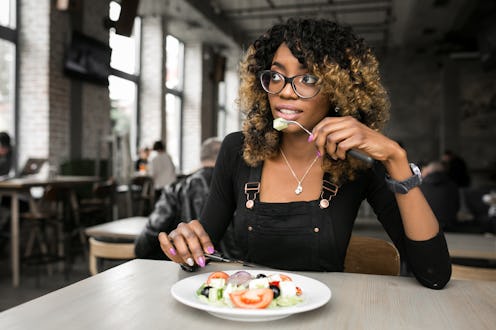Life
What Experts Want You To Know About Going Vegan When You're Anemic

If you've been thinking about changing what you eat, you might be wondering if you can be vegan if you're anemic. And with good reason. If you have a health concern, it only makes sense to consider how your diet will impact your symptoms, and to weigh the pros and cons.
So first, let's talk about why it might be a concern at all. "Anemia is a term for a lack of red blood cells in the body, which can lead to weakness [...] and more health problems if it's severe," registered dietician Diana Gariglio-Clelland, tells Bustle. Other symptoms include fatigue, irregular heartbeat, dizziness, and cold hands and feet.
While a doctor will have to determine the underlying cause, and treat you accordingly, anemia can certainly be affected by your diet, Gariglio-Clelland says, adding that "certain nutrients help build red blood cells, such as iron and vitamin B12." These nutrients are found in everyday foods like eggs, red meat, chicken, and dairy, all of which are decidedly not vegan.
If you cut them out, it's easy to see why some "vegan diets can potentially be low in iron and B12," she says. "However, it can be safe to go on a vegan diet while anemic if the proper precautions are taken."
If you'd like to stop eating animal products, even if you're anemic, feel free to give it a try. "There are plenty of plant foods that contain adequate amounts of iron and folate," Cristen Lindsay RD, CNSC, a registered dietitian nutritionist, tells Bustle. In order to get these important nutrients, along with the aforementioned vitamin B12, all you'll need to do is pay attention to your meals, she says, as a way of ensuring you're eating a well-balanced diet.
"To avoid anemia on a vegan diet, it's important to eat iron-rich foods such as legumes, dried fruit, iron-fortified grains, and dark green leafy vegetables," Gariglio-Clelland says. While these don't have to be the only foods you eat, they should be included in your diet. You can even increase the absorption of iron from plant sources, Lindsay says, by eating them along with foods that contain vitamin C, like citrus fruits.
The nutrient you might have a tougher time getting on a vegan diet is vitamin B12. "B12 is harder to come by in vegan sources, but nutritional yeast is a great option as it's rich in B12," Gariglio-Clelland says. You can also ask your doctor about vitamin B12 supplements. They can help you figure out if you're becoming deficient in this, and other nutrients, and offers ways to help you make up for it.
"When in doubt, supplementing with iron and/or B12 (it's important to know which kind of anemia [you have] in order to properly supplement) is a good way to ensure [you're] getting the nutrients [you] need if [your] diet falls short," Gariglio-Clelland says.
It'll also be help to avoid the common mistake of replacing animal products with processed foods, and calling it day. "Vegans can have problems if they have a diet high in processed vegan foods and low in fruits, vegetables, legumes, and whole grains," Marta Ferraz Valles, a registered dietician who sees patients in Mercy’s Institute for Digestive Health and Liver Disease, tells Bustle. "Meat intake is not necessary to avoid anemia." But having a balanced diet is.
If you have anemia, start by finding out which kind it is, Ferraz Valles says, and why it's happening. You'll want to follow what your doctor recommends, in terms of treatment. But from there, you can certainly be a vegan, and feel good doing it, if you keep an eye on what you eat, and make sure you're getting key nutrients like iron and vitamin B12.
Experts:
Diana Gariglio-Clelland, registered dietician
Cristen Lindsay RD, CNSC, registered dietitian nutritionist
Marta Ferraz Valles, registered dietician
This article was originally published on